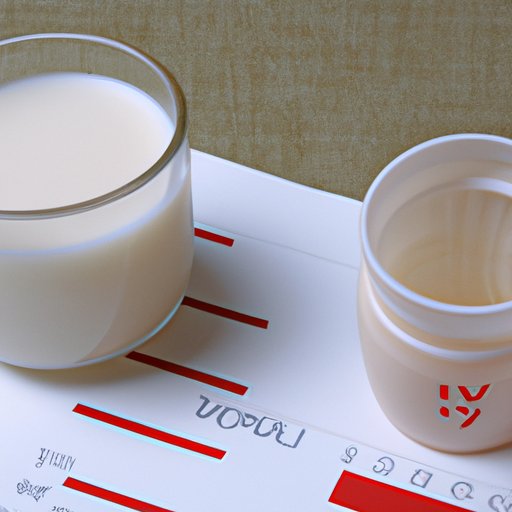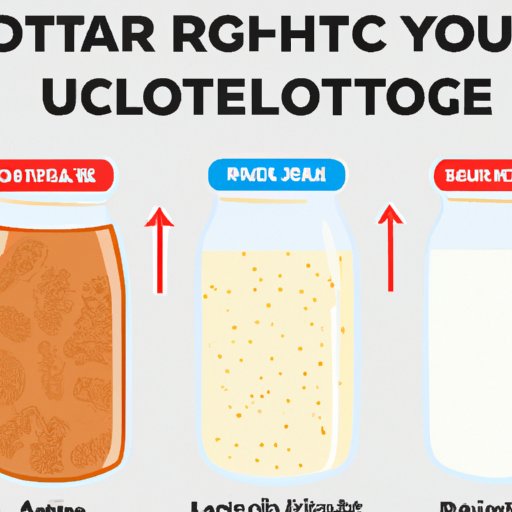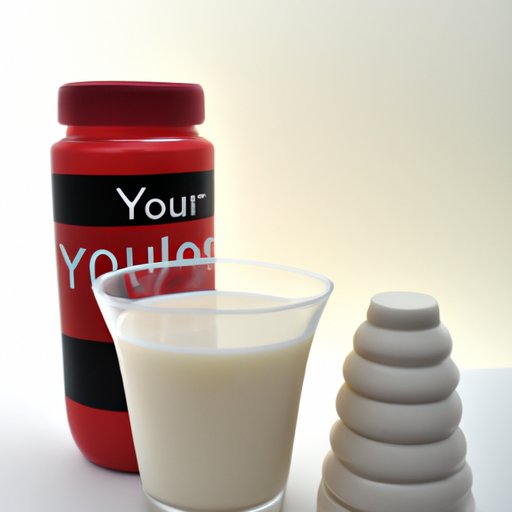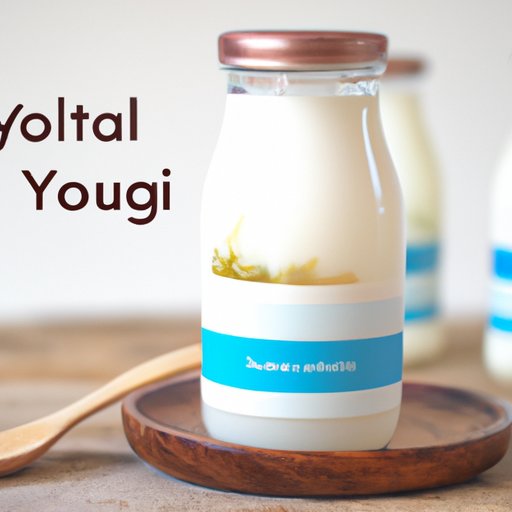Introduction
Yakult is a popular probiotic drink made from skimmed milk and cultures of the lactic acid bacteria Lactobacillus casei Shirota. It was developed in Japan in 1935 by microbiologist Minoru Shirota, who believed that certain beneficial bacteria could help promote health and prevent disease.
The question of whether Yakult is healthy or not has been debated for some time. While it contains beneficial bacteria, it also contains added sugars and preservatives. To better understand the health benefits and risks associated with drinking Yakult, it’s important to look at its nutritional value and examine how it compares to other probiotic drinks.

Analyzing the Nutritional Value of Yakult
Yakult is made from skimmed milk, which gives it a creamy texture and makes it an excellent source of protein. Each bottle of Yakult contains 40 calories, 5 grams of sugar, and 2 grams of protein. It is also fortified with vitamins B6 and B12, which are essential for energy production and immune system health.
Yakult also contains live cultures of Lactobacillus casei Shirota, a strain of beneficial bacteria which helps to support digestive health. The bacteria work by breaking down carbohydrates and producing lactic acid, which helps to reduce the pH levels in the intestines and create a more favorable environment for healthy gut flora. The bacteria also produce short-chain fatty acids, which have anti-inflammatory properties and can help to reduce the risk of certain diseases.
Examining the Health Benefits of Drinking Yakult
Drinking Yakult can provide several potential health benefits. First, the probiotics found in Yakult can help to boost immunity by promoting the growth of healthy bacteria in the gut. This can help to reduce the risk of infection and prevent colds and flu.
Second, Yakult can help to enhance digestive health by improving the balance of good and bad bacteria in the intestines. This can help to reduce bloating and improve nutrient absorption.
Finally, Yakult can help to improve the gut microbiome, which is the collection of bacteria that lives in the intestines. A healthy gut microbiome can help to reduce inflammation and improve overall health.

Comparison of Yakult to Other Probiotic Drinks
When considering the health benefits of Yakult, it’s important to compare it to other probiotic drinks. Yogurt is one of the most popular probiotic drinks and is made from cow’s milk. It is rich in calcium and protein, but it is also high in fat and sugar. Kefir is another popular probiotic drink, made from fermented cow’s milk. It is lower in fat and sugar than yogurt, and it also contains beneficial bacteria and yeasts.
Fermented milk is another type of probiotic drink, made from cow’s milk and beneficial bacteria. It has a similar nutritional profile to yogurt and kefir, but it is usually lower in fat and sugar. All three of these drinks contain beneficial bacteria, but they differ in terms of their nutritional value and taste.
In comparison to the other probiotic drinks, Yakult is lower in fat and sugar and higher in protein. It also has a milder taste, which may be more appealing to some people. However, it does not contain as many beneficial bacteria as yogurt, kefir, or fermented milk.

Exploring the Role of Yakult in a Balanced Diet
While Yakult can be beneficial for health, it is important to consume it in moderation. The recommended intake of Yakult is one bottle per day for adults, and half a bottle for children. Consuming too much Yakult can lead to weight gain due to its high sugar content. It is also important to remember that Yakult should not be used as a replacement for a balanced diet, and should instead be consumed as a supplement to a nutritious diet.
It is also important to remember the importance of variety when it comes to probiotics. Different probiotic drinks contain different strains of beneficial bacteria, so it is important to consume a variety of probiotic drinks to ensure that you are getting the full range of benefits.
Investigating Yakult’s Impact on Gut Health
Yakult contains both prebiotics and probiotics, which can help to promote gut health. Prebiotics are indigestible fibers that act as food for the beneficial bacteria in the gut. They help to nourish the bacteria, allowing them to thrive and multiply. Probiotics, on the other hand, are live bacteria that can help to balance the gut microbiome and reduce inflammation.
Research has shown that consuming Yakult can help to improve gut health by reducing inflammation and supporting the growth of beneficial bacteria. It can also help to reduce symptoms of irritable bowel syndrome, such as bloating and abdominal pain. Furthermore, studies have shown that Yakult can help to reduce the risk of certain illnesses, such as allergies and asthma.
Conclusion
In conclusion, Yakult is a popular probiotic drink that can provide several potential health benefits. It is low in fat and sugar and high in protein, and it contains beneficial bacteria which can help to boost immunity and improve digestive health. However, it is important to remember that Yakult should be consumed in moderation, and it should not be used as a replacement for a balanced diet.
When comparing Yakult to other probiotic drinks, it is clear that it is lower in fat and sugar and higher in protein. It also has a milder taste, which may be more appealing to some people. Furthermore, research has shown that consuming Yakult can help to improve gut health by reducing inflammation and supporting the growth of beneficial bacteria.
All in all, Yakult can be a healthy addition to a balanced diet. However, it is important to remember to consume it in moderation and to include a variety of probiotic drinks in your diet for optimal health benefits.
(Note: Is this article not meeting your expectations? Do you have knowledge or insights to share? Unlock new opportunities and expand your reach by joining our authors team. Click Registration to join us and share your expertise with our readers.)
